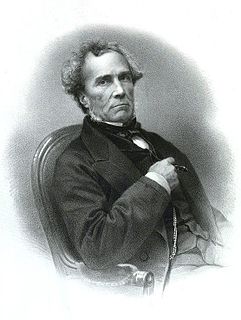A Quote by Ralph Waldo Emerson
Our condition as men is risky and ticklish enough. One can not be sure of himself and his fortune an hour, but he may be whisked off into some pitiable or ridiculous plight.
Related Quotes
A man who has cured himself of all ridiculous prepossessions, and is fully, sincerely, and steadily convinced, from experience as well as philosophy, that the difference of fortune makes less difference in happiness than is vulgarly imagined; such a one does not measure out degrees of esteem according to the rent-rolls of his acquaintance. ... his internal sentiments are more regulated by the personal characters of men, than by the accidental and capricious favors of fortune.
I have seen the Indian in his forests, and the Negro in his chains, and thought, as I contemplated their pitiable condition, that I saw the very extreme of human wretchedness; but I did not then know the condition of unfortunate Ireland...In all countries, more or less, paupers may be discovered; but an entire nation of paupers is what was never seen until it was shown in Ireland.
It is a proverbial expression that every man is the maker of his own fortune, and we usually regard it as implying that every man by his folly or wisdom prepares good or evil for himself. But we may view it in another light, namely, that we may so accommodate ourselves to the dispositions of Providence as to be happy in our lot, whatever may be its privations.
Strange is the vigour in a brave man's soul. The strength of his spirit and his irresistible power, the greatness of his heart and the height of his condition, his mighty confidence and contempt of danger, his true security and repose in himself, his liberty to dare and do what he pleaseth, his alacrity in the midst of fears, his invincible temper, are advantages which make him master of fortune.
Nature never rhymes her children, nor makes two men alike. When we see a great man, we fancy a resemblance to some historical person, and predict the sequel of his character and fortune, a result which he is sure to disappoint. None will ever solve the problem of his character according to our prejudice, but only in his high unprecedented way.
In whatever area in life one may meet the challenges of courage, whatever may be the sacrifices he faces if he follows his conscience - the loss of his friends, his fortune, his contentment, even the esteem of his fellow men - each man must decide for himself the course he will follow. The stories of past courage can define that ingredient - they can teach, they can offer hope, they can provide inspiration. But they cannot supply courage itself. For this each man must look into his own soul.
Let no youth have any anxiety about the upshot of his education, whatever the line of it may be. If he keep faithfully busy each hour of the working-day, he may safely leave the result to itself. He can with perfect certainty count on waking up some fine morning to find himself one of the competent ones of his generation.
It is a common error, and the greater and more mischievous for being so common, to believe that repentance best becomes and most concerns dying men. Indeed, what is necessary every hour of our life is necessary in the hour of death too, and as long as one lives he will have need of repentance, and therefore it is necessary in the hour of death too; but he who hath constantly exercised himself in it in his health and vigor, will do it with less pain in his sickness and weakness; and he who hath practiced it all his life, will do it with more ease and less perplexity in the hour of his death.
While dwelling with pleasing satisfaction upon the superior excellence of our political institutions, let us not be unmindful that liberty is power; that the nation blessed with the largest portion of liberty must in proportion to its numbers be the most powerful nation upon earth, and that the tenure of power by man is, in the moral purposes of his Creator, upon condition that it shall be exercised to ends of beneficence, to improve the condition of himself and his fellow men.
Now, to a single-minded man, who is either brave enough or reckless enough to surrender himself wholly to one idea, and look neither right nor left, but only forward, what earthly consequences may follow is not material. Persecution strengthens him; and so he is sure he is right, whether his course end in a prison or on a throne is no matter at all. But men of this calibre are uncommon in any age or in any country very uncommon in this age and this country.







































